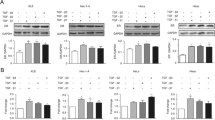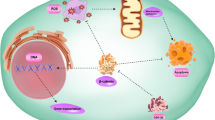Abstract
TGF-β1 is a main inducer of epithelial to mesenchymal transition (EMT). However, many breast cancer cells are not sensitive to the EMT induction by TGF-β1 alone. So far, the mechanisms underlying the induction of TGF-β1-insensitive breast cancer cells remains unclear. Here we report that TNF-α can induce EMT and invasiveness of breast cancer cells which are insensitive to TGF-β1. Intriguingly, TGF-β1 could cooperate with TNF-α to promote the EMT and invasiveness of breast cancer cells. The prolonged co-stimulation with TGF-β1 and TNF-α could enhance the sustained activation of Smad2/3, p38 MAPK, ERK, JNK and NF-κB pathways by enhancing the activation of TAK1, which was mediated by the gradually up-regulated TβRs. Except for JNK, all of these pathways were required for the effects of TGF-β1 and TNF-α. Importantly, the activation of p38 MAPK and ERK pathways resulted in a positive feed-back effect on TAK1 activation by up-regulating the expression of TβRs, favoring the activation of multiple signaling pathways. Moreover, SLUG was up-regulated and required for the TGF-β1/TNF-α-induced EMT and invasiveness. In addition, SLUG could also enhance the activation of signaling pathways by promoting TβRII expression. These findings suggest that the up-regulation of TβRs contributes to the sustained activation of TAK1 induced by TGF-β1/TNF-α and the following activation of multiple signaling pathways, resulting in EMT and invasiveness of breast cancer cells.





Similar content being viewed by others
Abbreviations
- EMT:
-
Epithelial to mesenchymal transition
- ERK1/2:
-
Extracellular signal-regulated kinase
- JNK:
-
C-Jun N-terminal kinase
- MAPKs:
-
Mitogen activated protein kinases
- NF-κB:
-
Nuclear factor kappa-light-chain-enhancer of activated B cells
- TAK1:
-
Transforming growth factor-β activated kinase 1
- TGF-β1:
-
Transforming growth factor-β1
- TNF-α:
-
Tumor necrosis factor-α
- TβRI:
-
Transforming growth factor-β receptor type I
- TβRII:
-
Transforming growth factor-β receptor type II
References
Balkwill F (2006) TNF-alpha in promotion and progression of cancer. Cancer Metastasis Rev 25:409–416
Bates RC, Mercurio AM (2003) Tumor necrosis factor-alpha stimulates the epithelial-to-mesenchymal transition of human colonic organoids. Mol Biol Cell 14:1790–1800
Brown KA, Aakre ME, Gorska AE, Price JO, Eltom SE, Pietenpol JA, Moses HL (2004) Induction by transforming growth factor-β1 of epithelial to mesenchymal transition is a rare event in vitro. Breast Cancer Res 6:R215
Chuang MJ, Sun KH, Tang SJ, Deng MW, Wu YH, Sung JS, Cha TL, Sun GH (2008) Tumor-derived tumor necrosis factor-alpha promotes progression and epithelial-mesenchymal transition in renal cell carcinoma cells. Cancer Sci 99:905–913
de Caestecker MP, Piek E, Roberts AB (2000) Role of transforming growth factor-beta signaling in cancer. J Natl Cancer Inst 92:1388–1402
Dhasarathy A, Phadke D, Mav D, Shah RR, Wade PA (2011) The transcription factors snail and slug activate the transforming growth factor-Beta signaling pathway in breast cancer. PLoS One 6:e26514
Do TV, Kubba LA, Du H, Sturgis CD, Woodruff TK (2008) Transforming growth factor-beta1, transforming growth factor-beta2, and transforming growth factor-beta3 enhance ovarian cancer metastatic potential by inducing a Smad3-dependent epithelial-to-mesenchymal transition. Mol Cancer Res 6:695–705
Foroni C, Broggini M, Generali D, Damia G (2012) Epithelial-mesenchymal transition and breast cancer: role, molecular mechanisms and clinical impact. Cancer Treat Rev 38:689–697
Gardner A, Fisher AJ, Richter C, Johnson GE, Moisey EJ, Brodlie M, Ward C, Krippner-Heidenreich A, Mann DA, Borthwick LA (2012) The critical role of TAK1 in accentuated epithelial to mesenchymal transition in obliterative bronchiolitis after lung transplantation. Am J Pathol 180:2293–2308
Gupta J, Robbins J, Jilling T, Seth P (2011) TGFbeta-dependent induction of interleukin-11 and interleukin-8 involves SMAD and p38 MAPK pathways in breast tumor models with varied bone metastases potential. Cancer Biol Ther 11:311–316
Huber MA, Azoitei N, Baumann B, Grünert S, Sommer A, Pehamberger H, Kraut N, Beug H, Wirth T (2004) NF-kappaB is essential for epithelial-mesenchymal transition and metastasis in a model of breast cancer progression. J Clin Invest 114:569–581
Joseph MJ, Dangi-Garimella S, Shields MA, Diamond ME, Sun L, Koblinski JE, Munshi HG (2009) Slug is a downstream mediator of transforming growth factor-beta1-induced matrix metalloproteinase-9 expression and invasion of oral cancer cells. J Cell Biochem 108:726–736
Kajino T, Omori E, Ishii S, Matsumoto K, Ninomiya-Tsuji J (2007) TAK1 MAPK kinase kinase mediates transforming growth factor-beta signaling by targeting snoN oncoprotein for degradation. J Biol Chem 282:9475–9481
Landstrom M (2010) The TAK1-TRAF6 signalling pathway. Int J Biochem Cell Biol 42:585–589
Li CW, Xia W, Huo L, Lim SO, Wu Y, Hsu JL, Chao CH, Yamaquchi H, Yang NK, Ding Q et al (2012) Epithelial-mesenchymal transition induced by TNF-α requires NF-κB-mediated transcriptional up-regulation of Twist1. Cancer Res 72:1290–1300
Liao SJ, Zhou YH, Yuan Y, Li D, Wu FH, Wang Q, Zhu JH, Yan B, Wei JJ, Zhang GM, Feng ZH (2012) Triggering of toll-like receptor 4 on metastatic breast cancer cells promotes alphavbeta3-mediated adhesion and invasive migration. Breast Cancer Res Treat 133:853–863
Maier HJ, Schmidt-Strassburger U, Huber MA, Wiedemann EM, Beug H, Wirth T (2010) NF-kappaB promotes epithelial-mesenchymal transition, migration and invasion of pancreatic carcinoma cells. Cancer Lett 295:214–228
Meulmeester E, ten Dijke P (2011) The dynamic roles of TGF-β in cancer. J Pathol 223:206–219
Neil JR, Schiemann WP (2008) Altered TAB1:IkappaB kinase interaction promotes transforming growth factor beta-mediated nuclear factor-kappaB activation during breast cancer progression. Cancer Res 68:1462–1470
Pechkovsky DV, Scaffidi AK, Hackett TL, Ballard J, Shaheen F, Thompson PJ, Thannickal VJ, Knight DA (2008) Transforming growth factor beta1 induces alphavbeta3 integrin expression in human lung fibroblasts via a beta3 integrin-, c-Src-, and p38 MAPK-dependent pathway. J Biol Chem 283:12898–12908
Said NABM, Williams ED (2011) Growth factors in induction of epithelial- mesenchymal transition and metastasis. Cells Tissues Organs 193:85–97
Sakurai H, Miyoshi H, Toriumi W, Sugita T (1999) Functional interactions of transforming growth factor beta-activated kinase 1 with IkappaB kinases to stimulate NF-kappaB activation. J Biol Chem 274:10641–10648
Sakurai H, Suzuki S, Kawasaki N, Nakano H, Okazaki T, Chino A, Doi T, Saiki I (2003) Tumor necrosis factor-alpha-induced IKK phosphorylation of NF-kappaB p65 on serine 536 is mediated through the TRAF2, TRAF5, and TAK1 signaling pathway. J Biol Chem 278:36916–36923
Singh SR, Rameshwar P, Siegel P (2016) Targeting tumor microenvironment in cancer therapy. Cancer Lett 380:203–204
Soria G, Ofri-Shahak M, Haas I, Yaal-Hahoshen N, Leider-Trejo L, Leibovich-Rivkin T, Weitzenfeld P, Meshel T, Shabtai E, Gutman M et al (2011) Inflammatory mediators in breast cancer: coordinated expression of TNFalpha & IL-1beta with CCL2 & CCL5 and effects on epithelial-to- mesenchymal transition. BMC Cancer 11:130
Strippoli R, Benedicto I, Perez Lozano ML, Pellinen T, Sandoval P, Lopez-Cabrera M, delo Pozo MA (2012) Inhibition of transforming growth factor-activated kinase 1 (TAK1) blocks and reverses epithelial to mesenchymal transition of mesothelial cells. PLoS One 7:e31492
Thiery JP (2002) Epithelial-mesenchymal transitions in tumor progression. Nat Rev Cancer 2:442–454
Tsuji T, Ibaragi S, Hu GF (2009) Epithelial-mesenchymal transition and cell cooperativity in metastasis. Cancer Res 69:7135–7139
Uttamsingh S, Bao X, Nguyen KT, Bhanot M, Gong J, Chan JLK, Liu F, Chu TT, Wang LH (2007) Synergistic effect between EGF and TGF-β1 in inducing oncogenic properties of intestinal epithelial cells. Oncogene 27:2626–2634
Xu J, Lamouille S, Derynck R (2009) TGF-β-induced epithelial to mesenchymal transition. Cell Res 19:156–172
Yamaguchi K, Shirakabe K, Shibuya H, Irie K, Oishi I, Ueno N, Taniquchi T, Nishida E, Matsumoto K (1995) Identification of a member of the MAPKKK family as a potential mediator of TGF-beta signal transduction. Science 270:2008–2011
Yamauchi Y, Kohyama T, Takizawa H, Kamitani S, Desaki M, Takami K, Kawasaki S, Kato J, Nagase T (2010) Tumor necrosis factor-alpha enhances both epithelial-mesenchymal transition and cell contraction induced in A549 human alveolar epithelial cells by transforming growth factor-β1. Exp Lung Res 36:12–24
Yan L, Xu F, Dai CL (2018) Relationship between epithelial-to-mesenchymal transition and the inflammatory microenvironment of hepatocellular carcinoma. J Exp Clin Cancer Res 37:203
Zhang YE (2009) Non-Smad pathways in TGF-beta signaling. Cell Res 19:128–139
Zhou YH, Liao SJ, Li D, Luo J, Wei JJ, Yan B, Sun R, Shu Y, Wang Q, Zhang GM, Feng ZH (2013) TLR4 ligand/H2O2 enhances TGF-b1 signaling to induce metastatic potential of non-invasive breast cancer cells by activating non-Smad pathways. PLoS ONE 8:e65906
Acknowledgements
We gratefully thank Prof. Xing-Zhen Chen (Department of Physiology, University of Alberta, Canada) and Dr. Feng-Hua Wu (Department of Physiology, Hubei University of Chinese Medcine, China) for modifying the manuscript and their valuable advice.
Funding
This work was supported by National Natural Science Foundation of China (No.81472704, 81272314, 30830095), National Development Program (973) For Key Basic Research of China (No. 2009CB521806).
Author information
Authors and Affiliations
Contributions
SJL and ZHF conceived and designed the experiments; SJL, JL, DL, YHZ, BY and JJW performed the experiment. JCT, YRL and GMZ interpreted and analyzed the data; SJL and ZHF wrote the manuscript. All authors read and approved the final manuscript.
Corresponding authors
Ethics declarations
Competing interests
The authors declare that they have no competing interests.
Additional information
Publisher’s note
Springer Nature remains neutral with regard to jurisdictional claims in published maps and institutional affiliations.
Rights and permissions
About this article
Cite this article
Liao, SJ., Luo, J., Li, D. et al. TGF-β1 and TNF-α synergistically induce epithelial to mesenchymal transition of breast cancer cells by enhancing TAK1 activation. J. Cell Commun. Signal. 13, 369–380 (2019). https://doi.org/10.1007/s12079-019-00508-8
Received:
Accepted:
Published:
Issue Date:
DOI: https://doi.org/10.1007/s12079-019-00508-8




